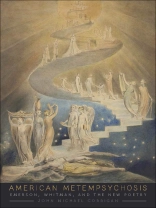The “transmigration of souls is no fable. I would it were, but men and women are only half human.” With these words, Ralph Waldo Emerson confronts a dilemma that illuminates the formation of American individualism: to evolve and become fully human requires a heightened engagement with history. Americans, Emerson argues, must realize history’s chronology in themselves—because their own minds and bodies are its evolving record.
Whereas scholarship has tended to minimize the mystical underpinnings of Emerson’s notion of the self, his depictions of “the metempsychosis of nature” reveal deep roots in mystical traditions from Hinduism and Buddhism to Platonism and Christian esotericism. In essay after essay, Emerson uses metempsychosis as an open-ended template to understand human development.
In Leaves of Grass, Walt Whitman transforms Emerson’s conception of metempsychotic selfhood into an expressly poetic event. His vision of transmigration viscerally celebrates the poet’s ability to assume and live in other bodies; his American poet seeks to incorporate the entire nation into his own person so that he can speak for every man and woman.
John Michael Corrigan
American Metempsychosis [EPUB ebook]
Emerson, Whitman, and the New Poetry
American Metempsychosis [EPUB ebook]
Emerson, Whitman, and the New Poetry
Mua cuốn sách điện tử này và nhận thêm 1 cuốn MIỄN PHÍ!
Ngôn ngữ Anh ● định dạng EPUB ● Trang 254 ● ISBN 9780823242368 ● Kích thước tập tin 0.4 MB ● Nhà xuất bản Fordham University Press ● Thành phố New York ● Quốc gia US ● Được phát hành 2012 ● Có thể tải xuống 24 tháng ● Tiền tệ EUR ● TÔI 4848158 ● Sao chép bảo vệ Adobe DRM
Yêu cầu trình đọc ebook có khả năng DRM












